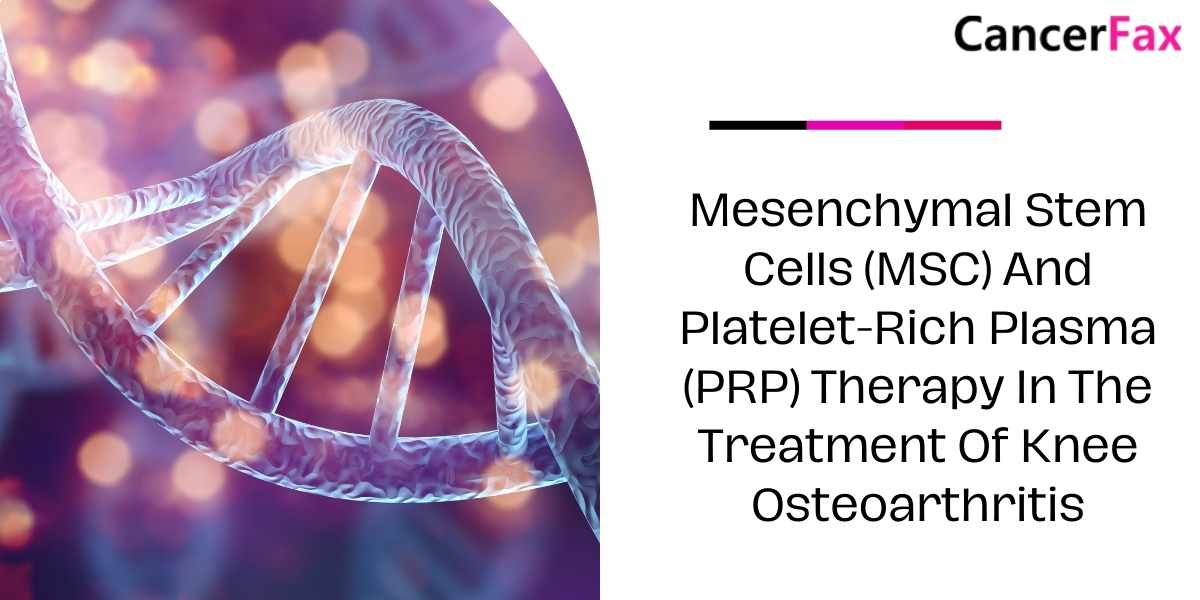Mesenchymal stem cells (MSC) and platelet-rich plasma (PRP) therapy in the treatment of knee osteoarthritis
Feb 2024: Mesenchymal stem cells (MSCs) and platelet-rich plasma (PRP) therapy have shown potential in treating knee osteoarthritis (KOA) in China. A meta-analysis of randomized controlled studies looked into the effectiveness and safety of MSCs mixed with PRP in treating KOA. The study discovered that the combination of MSCs and PRP was clinically effective in reducing pain and joint function in KOA patients. This treatment resulted in no significant difference in adverse responses when compared to MSCs alone.
Chinese researchers have also investigated the use of autologous bone marrow mesenchymal stem cells mixed with platelet-rich plasma for the treatment of knee osteoarthritis, with promising results. Furthermore, research has looked into the efficacy of peripheral blood-derived mesenchymal stem cells mixed with donor-matched platelet-rich plasma in treating knee osteoarthritis.
Platelet-rich plasma therapy has been routinely used to treat knee osteoarthritis, with data supporting its efficacy. PRP contains growth factors that promote tissue repair and regeneration, making it an important component in the treatment of osteoarthritis.
Finally, the combination of mesenchymal stem cells and platelet-rich plasma therapy shows promise for reducing pain, joint function, and tissue healing in Chinese knee osteoarthritis patients. Additional research and clinical trials are required to validate and optimize this therapeutic strategy.
You may like to read: CAR T-Cell therapy in China
What is mesenchymal stem cell therapy and how does it work?
Mesenchymal stem cell (MSC) therapy uses adult stem cells that can develop into bone, cartilage, muscle, and fat cells. MSCs are significant in regenerative therapy because they can self-renew and differentiate into many lineages. These cells can be obtained from bone marrow, adipose tissue, or umbilical cord tissue.
MSCs have immunomodulatory capabilities, which means they can regulate immune system function, reduce inflammation, and suppress immunological responses. This feature makes them potentially useful in the treatment of autoimmune disorders and transplant rejection. MSCs can also support tissue repair and regeneration by releasing growth factors and cytokines, which attract other cells to the damage site and induce the development of new blood vessels required for tissue repair.
MSCs’ therapeutic efficacy is determined by their capacity to move to the wounded location, adhere, and engraft in the target tissue. MSCs are largely non-immunogenic due to their immunophenotype, making them ideal for cell-based treatments in a variety of illnesses.
While MSC therapy has showed promise in preclinical studies for treating disorders such as osteogenesis imperfecta, Crohn’s Disease, Multiple Sclerosis, Parkinson’s, and others, more study is needed to fully grasp their potential and produce safe and effective medicines. To ensure MSC therapy’s safe and effective use in regenerative medicine, it is critical to address both its benefits and potential limitations.
You may like to read: CAR T Cell therapy for multiple myeloma in China
What are the different types of mesenchymal stem cells?
Mesenchymal stem cells (MSCs) are adult stem cells capable of self-renewal and differentiation into a variety of cell types. MSCs are classified into various categories based on their tissue of origin, each having its own set of features and applications:
1. Bone marrow-derived mesenchymal stem cells (BMSCs): These cells are largely derived from bone marrow and have been widely investigated for their regeneration capacity. Bone marrow stem cells can differentiate into bone, cartilage, adipose tissue, muscle, and other cell types.
2. Adipose tissue-derived mesenchymal stem cells (ADSCs): ADSCs are derived from adipose tissue and have similar qualities to BMSCs. They can differentiate into multiple cell types, making them useful for regenerative medical applications.
3. Umbilical Cord-Derived Mesenchymal Stem Cells (UC-MSCs): UC-MSCs are derived from umbilical cord tissue and have showed encouraging results in studies. These cells have multilineage differentiation capability and can develop into bone, cartilage, muscle, and other cell types.
Each type of MSC has distinct traits and advantages, making them useful for a variety of therapeutic applications. MSCs have enormous potential in regenerative therapy due to their ability to differentiate into numerous cell types and their immunomodulatory capabilities. Further study is being conducted to determine the full therapeutic potential of various types of MSCs in treating a wide range of diseases and disorders.
What are the side-effects of mesenchymal stem cells (MSC) and platelet-rich plasma (PRP) therapy ?
Mesenchymal stem cells (MSC) and platelet-rich plasma (PRP) therapy have showed promise in treating a variety of illnesses, but it is critical to evaluate the possible adverse effects. According to research, the combination of MSCs and PRP in treating knee osteoarthritis shown good clinical efficacy in terms of pain relief and joint function, with no significant difference in adverse effects when compared to MSCs alone.
While PRP has shown good safety and efficacy in treating knee osteoarthritis, the therapeutic benefit may decrease as the patient’s age increases. Furthermore, research has indicated that PRP can stimulate the proliferation and differentiation of MSCs, which can aid in tissue healing. However, it is important to remember that injection-related side effects, such as discomfort, nerve injury, and skin discoloration, are possible but rare.
Furthermore, when evaluating the impact of MSCs and PRP treatments on cutaneous wound healing, it is critical to evaluate cell senescence and overall cell viability to avoid negative outcomes and unrealistic expectations from cell therapy. Proper evaluation and comprehension of the origin of cells employed in therapy can help to minimize unfavorable outcomes.
In conclusion, while MSCs and PRP therapy have the potential to benefit a variety of conditions, including wound healing and osteoarthritis, it is critical to be aware of potential side effects and ensure proper evaluation and monitoring in order to maximize their effectiveness while minimizing risks.
What is the cost of MSC and PRP for knee osteoarthritis in China?
A unilateral MSC and PRP therapy for knee osteoarthritis in China will cost around $ 7000 USD and bilateral will cost around $ 12000 USD.
Dr. Nishant Mittal is a highly accomplished researcher with over 13 years of experience in the fields of cardiovascular biology and cancer research. His career is marked by significant contributions to stem cell biology, developmental biology, and innovative research techniques.
Research Highlights
Dr. Mittal's research has focused on several key areas:
1) Cardiovascular Development and Regeneration: He studied coronary vessel development and regeneration using zebrafish models1.
2) Cancer Biology: At Dartmouth College, he developed zebrafish models for studying tumor heterogeneity and clonal evolution in pancreatic cancer.
3) Developmental Biology: His doctoral work at Keio University involved identifying and characterizing medaka fish mutants with cardiovascular defects.
4) Stem Cell Research: He investigated the effects of folic acid on mouse embryonic stem cells and worked on cryopreservation techniques for hematopoietic stem cells.
Publications and Presentations
Dr. Mittal has authored several peer-reviewed publications in reputable journals such as Scientific Reports, Cardiovascular Research, and Disease Models & Mechanisms1. He has also presented his research at numerous international conferences, including the Stanford-Weill Cornell Cardiovascular Research Symposium and the Weinstein Cardiovascular Development Conference.
In summary, Dr. Nishant Mittal is a dedicated and accomplished researcher with a strong track record in cardiovascular and cancer biology, demonstrating expertise in various model systems and a commitment to advancing scientific knowledge through innovative research approaches.
- Comments Closed
- February 27th, 2024






Cartilage regeneration treatment, Mesenchymal stem cell injections, MSC therapy for knee osteoarthritis, Non-surgical knee pain relief, PRP treatment for knee pain, PRP vs stem cell therapy, Regenerative medicine for osteoarthritis, Stem cell therapy for arthritis
CancerFax is the most trusted online platform dedicated to connecting individuals facing advanced-stage cancer with groundbreaking cell therapies.
Send your medical reports and get a free analysis.
🌟 Join us in the fight against cancer! 🌟
Привет,
CancerFax — это самая надежная онлайн-платформа, призванная предоставить людям, столкнувшимся с раком на поздних стадиях, доступ к революционным клеточным методам лечения.
Отправьте свои медицинские заключения и получите бесплатный анализ.
🌟 Присоединяйтесь к нам в борьбе с раком! 🌟